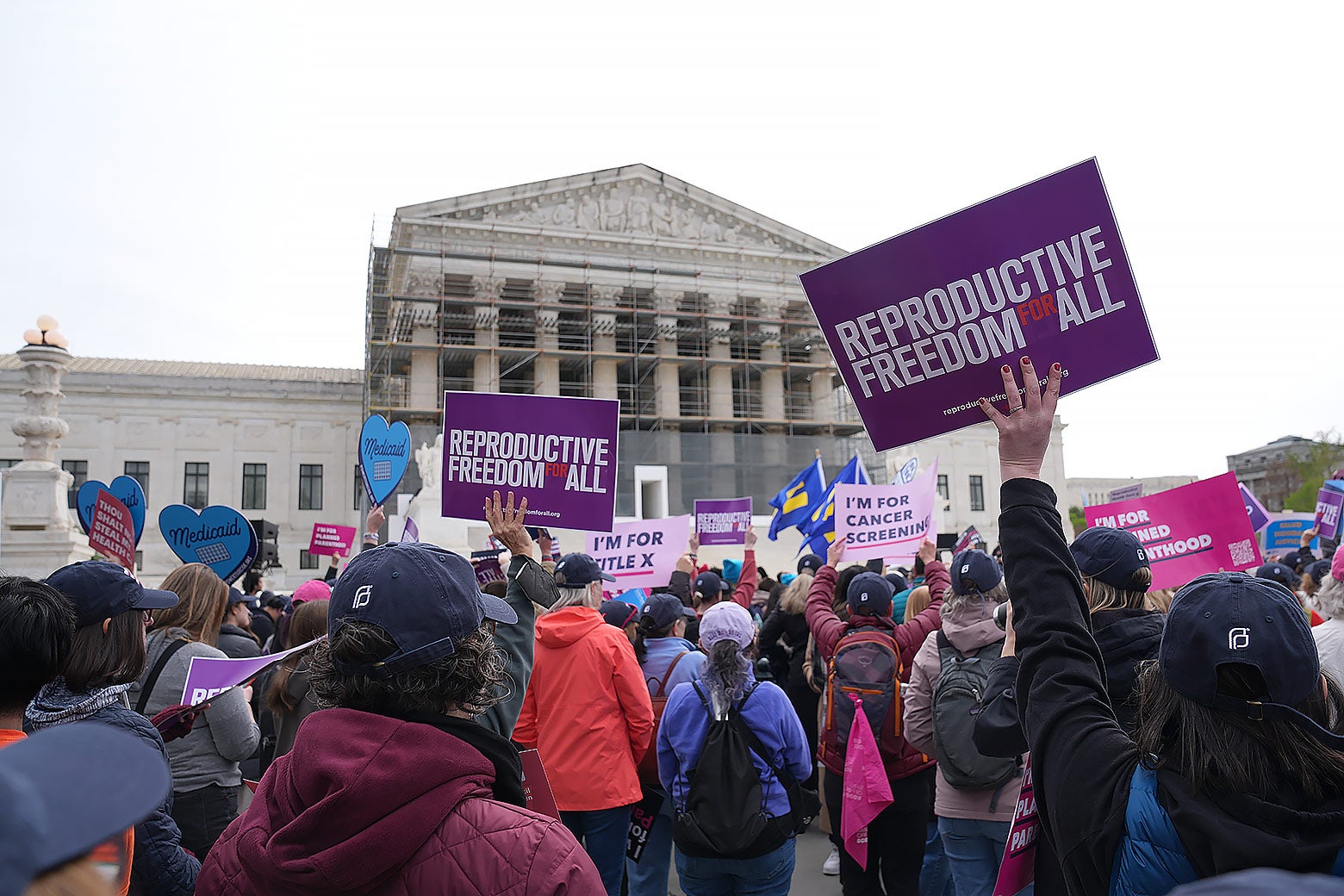Sign up for the Slatest to get the most insightful analysis, criticism, and advice out there, delivered to your inbox daily.
State constitutional litigation over reproductive rights is nothing new, but a case that will soon be decided in Wyoming will have major implications well beyond the nation’s least populated state. It’s the first time we’ll see a state Supreme Court decide whether a right to health care governs abortion access—and perhaps who gets to decide when life begins, and what the beginning of life means in law.
The case involves two Wyoming abortion bans, one criminalizing virtually all procedures from the moment of conception and another focusing on abortion pills. A group of plaintiffs that includes prospective patients, physicians, and nonprofits in the state has challenged the constitutionality of the bans. The plaintiffs made a wide variety of arguments that we haven’t seen as much since the fall of Roe v. Wade, contending, for example, that Wyoming’s law violated the state’s establishment and religious liberty clauses by inscribing certain religious views in the law.
Perhaps the most central argument involved one of the most recent amendments to the Wyoming Constitution, one passed in the wake of conservative backlash to Obamacare. Conservatives insisted that the Affordable Care Act would in fact strip Americans of the right to choose their provider and otherwise undermine the quality of their care. Wyoming and some other conservative states responded by creating state constitutional rights to health care access.
That’s where the plaintiffs started their case: They claimed that this right required any abortion ban to survive the most demanding standard of review, strict scrutiny, and that the state’s abortion bans fell short of meeting that bar. Abortion is health care, and the state doesn’t have a compelling interest in protecting fetal life, the plaintiffs reason, especially when a pregnancy would never lead to the birth of a healthy child, and when the state certainly doesn’t use the least restrictive means of pursuing that interest.
The state’s response in part is to argue that abortion isn’t health care. Wyoming explains that nothing can be health care unless it is intended to treat an illness or injury, and pregnancy qualifies as neither one. What’s more, Wyoming says, abortion can’t be health care because it impacts the pregnant woman and the unborn child—and because the state has already chosen to criminalize it.
The debate about the relationship between abortion and health care is obviously much bigger than anything that happens Wyoming. Arguments that abortion isn’t health care have underwritten attacks on the Food and Drug Administration’s approval of mifepristone, a drug used in more than half of all abortions. Those justifying the narrowness of abortion exceptions claim they are unnecessary because life-saving procedures don’t qualify as abortions. This is the first time a state court will weigh in on whether abortion counts as health care, but it likely won’t be the last. Other states with abortion bans have “right to health care” amendments. Provisions designed to make the Affordable Care Act look bad could be a surprising new tool to challenge abortion bans, and could reinforce the argument that abortion is a form of medical treatment.
But the case could matter beyond the definition of health care. Wyoming argues that even if there is a right to health care access, the state can act to protect fetal life. The plaintiffs answer that there is no secular way to justify the state’s definition of when life begins, and that if anyone should settle the question of when life or rights begin, it must be the individual. Thus, they argue, defining fetal life this way would be a violation of religious liberty.
Arguments about the role of religion in fights over abortion have been present from the very beginning. In the 1960s and 1970s, when the anti-abortion movement was heavily Catholic, abortion-rights lawyers claimed that abortion bans imposed sectarian ideology in violation of the establishment clause. The anti-abortion movement has changed since then, with conservative Protestants among the most numerous and vocal members of the movement. And the U.S. Supreme Court shut down establishment arguments in 1980 in a case called Harris v. McRae, reasoning that there were secular, moral reasons for opposing abortion.
It’s certainly possible that the Wyoming Supreme Court will just repeat the arguments made in McRae. But the Wyoming Legislature was quite open about the role of faith in its deliberations. The anti-abortion movement more broadly has more openly discussed its cause as a Christian one, particularly as prominent groups in the conservative Christian legal movement, like the Alliance Defending Freedom, have gained influence. And those with religious beliefs requiring some forms of abortion access have been more vocal too, filing lawsuits in state and federal court. At oral argument last week, the Wyoming Supreme Court seemed interested in tackling whether the state could constitutionally decide when life began—or who got to decide such a fraught question.
It’s easy to ignore developments in a state like Wyoming, which has a population of less than 600,000, and likely won’t serve as a regional hub for access given that Americans in the Mountain West could already travel to other places, like Montana or Colorado, that protect the procedure. But states have been where to date some of the most important fights over reproductive rights have been waged, and where the arguments that will eventually come to federal court are refined. That’s why it’s worth watching what comes next in Wyoming, where the state Supreme Court has to issue a decision by August. The court’s ruling will shape debates about the role of religion in abortion bans—and whether abortion counts as health care after all.

